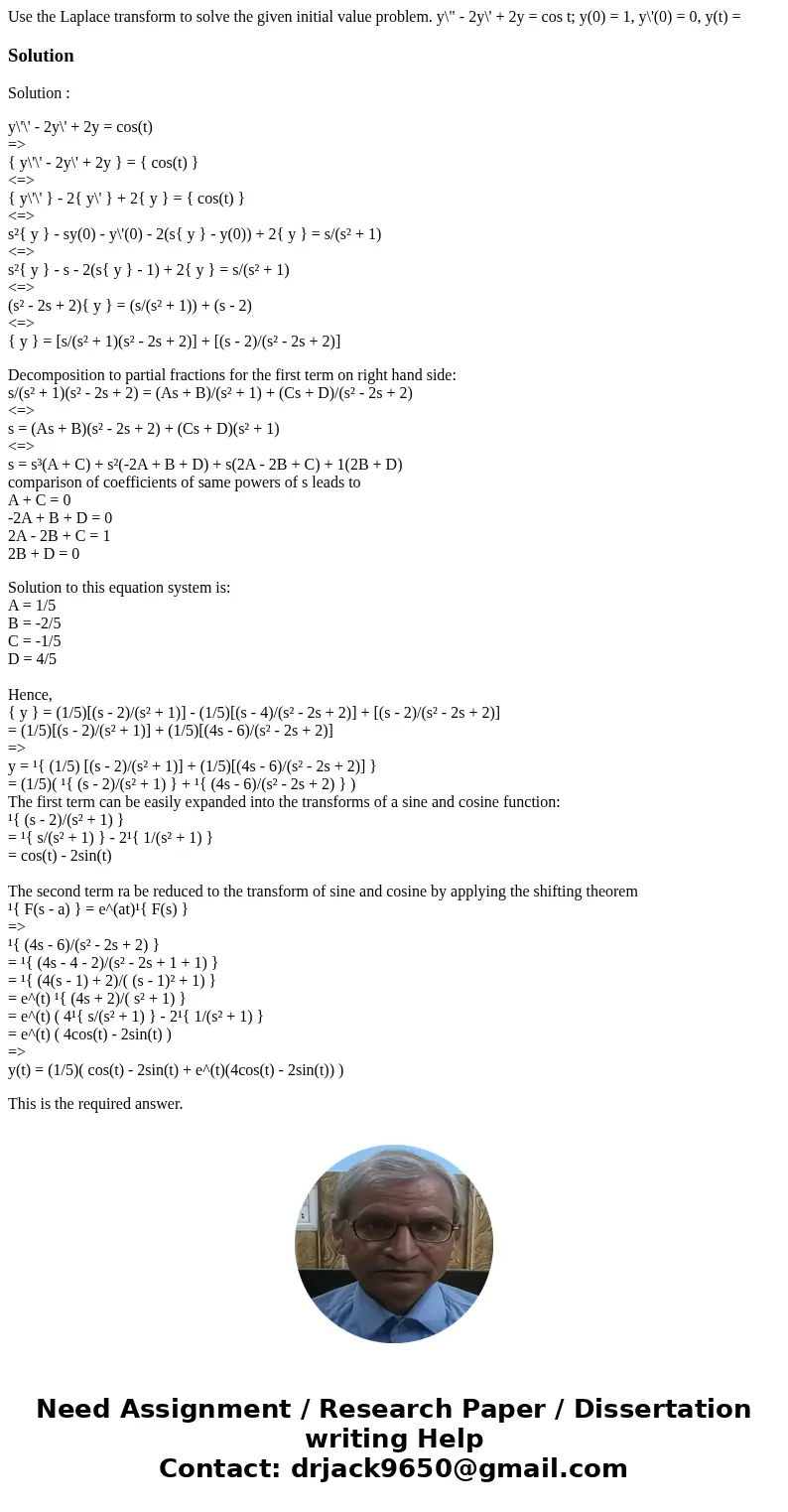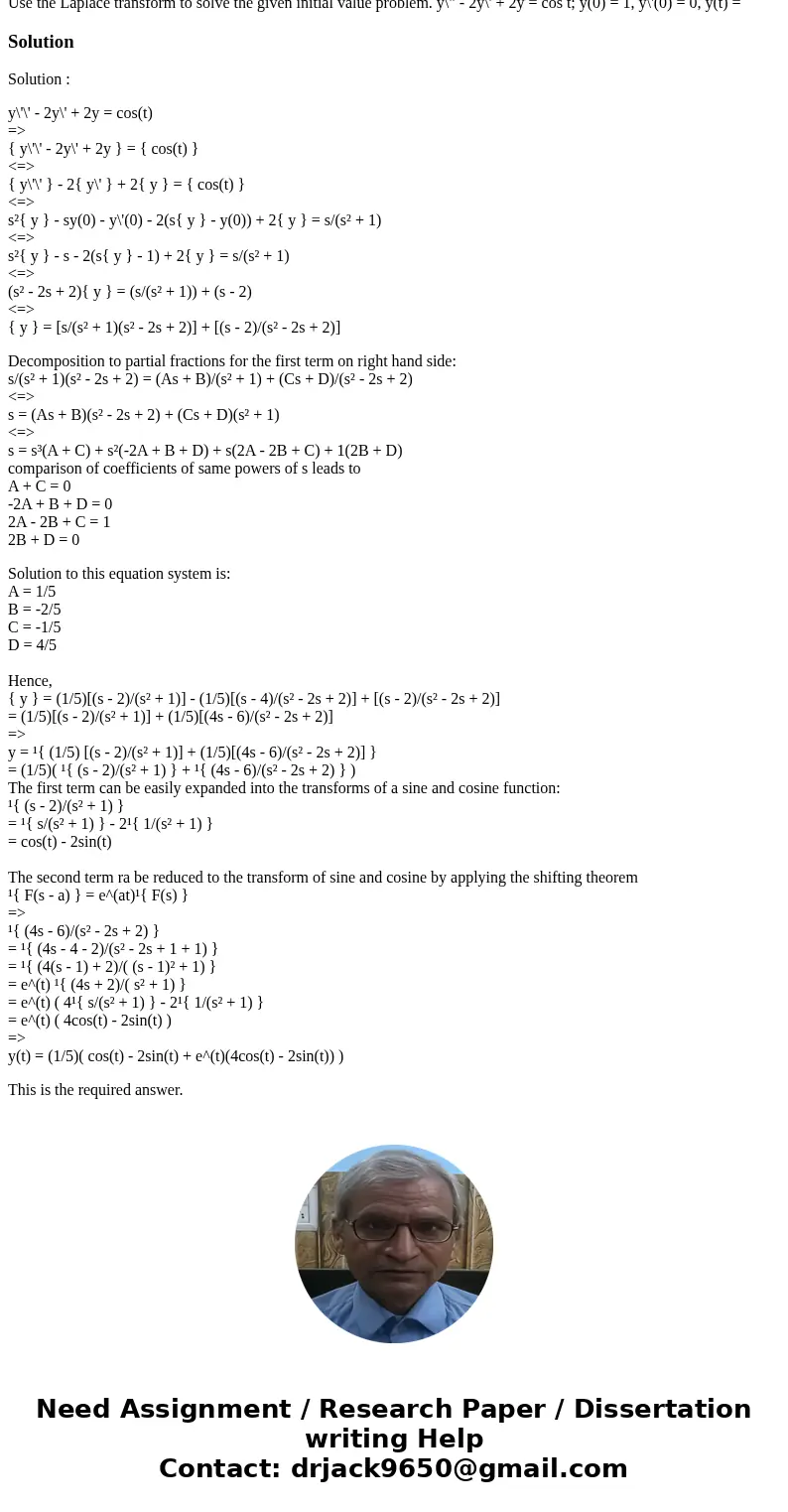Use the Laplace transform to solve the given initial value p
Solution
Solution :
y\'\' - 2y\' + 2y = cos(t)
=>
{ y\'\' - 2y\' + 2y } = { cos(t) }
<=>
{ y\'\' } - 2{ y\' } + 2{ y } = { cos(t) }
<=>
s²{ y } - sy(0) - y\'(0) - 2(s{ y } - y(0)) + 2{ y } = s/(s² + 1)
<=>
s²{ y } - s - 2(s{ y } - 1) + 2{ y } = s/(s² + 1)
<=>
(s² - 2s + 2){ y } = (s/(s² + 1)) + (s - 2)
<=>
{ y } = [s/(s² + 1)(s² - 2s + 2)] + [(s - 2)/(s² - 2s + 2)]
Decomposition to partial fractions for the first term on right hand side:
s/(s² + 1)(s² - 2s + 2) = (As + B)/(s² + 1) + (Cs + D)/(s² - 2s + 2)
<=>
s = (As + B)(s² - 2s + 2) + (Cs + D)(s² + 1)
<=>
s = s³(A + C) + s²(-2A + B + D) + s(2A - 2B + C) + 1(2B + D)
comparison of coefficients of same powers of s leads to
A + C = 0
-2A + B + D = 0
2A - 2B + C = 1
2B + D = 0
Solution to this equation system is:
A = 1/5
B = -2/5
C = -1/5
D = 4/5
Hence,
{ y } = (1/5)[(s - 2)/(s² + 1)] - (1/5)[(s - 4)/(s² - 2s + 2)] + [(s - 2)/(s² - 2s + 2)]
= (1/5)[(s - 2)/(s² + 1)] + (1/5)[(4s - 6)/(s² - 2s + 2)]
=>
y = ¹{ (1/5) [(s - 2)/(s² + 1)] + (1/5)[(4s - 6)/(s² - 2s + 2)] }
= (1/5)( ¹{ (s - 2)/(s² + 1) } + ¹{ (4s - 6)/(s² - 2s + 2) } )
The first term can be easily expanded into the transforms of a sine and cosine function:
¹{ (s - 2)/(s² + 1) }
= ¹{ s/(s² + 1) } - 2¹{ 1/(s² + 1) }
= cos(t) - 2sin(t)
The second term ra be reduced to the transform of sine and cosine by applying the shifting theorem
¹{ F(s - a) } = e^(at)¹{ F(s) }
=>
¹{ (4s - 6)/(s² - 2s + 2) }
= ¹{ (4s - 4 - 2)/(s² - 2s + 1 + 1) }
= ¹{ (4(s - 1) + 2)/( (s - 1)² + 1) }
= e^(t) ¹{ (4s + 2)/( s² + 1) }
= e^(t) ( 4¹{ s/(s² + 1) } - 2¹{ 1/(s² + 1) }
= e^(t) ( 4cos(t) - 2sin(t) )
=>
y(t) = (1/5)( cos(t) - 2sin(t) + e^(t)(4cos(t) - 2sin(t)) )
This is the required answer.


 Homework Sourse
Homework Sourse